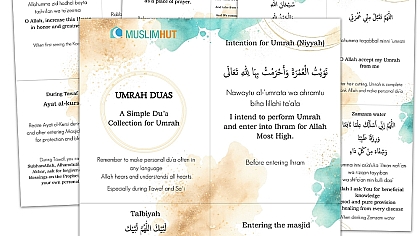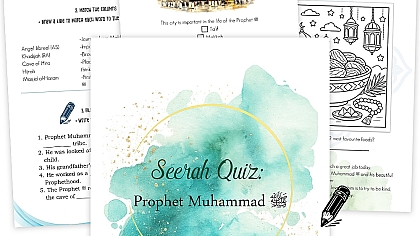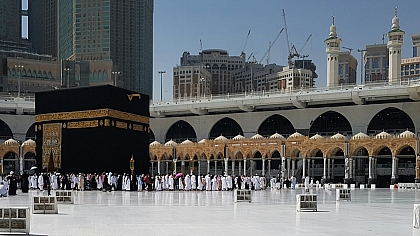
Hadith: The Essential Guide to Understanding the Teachings of Islam
What You Need to Know About Hadith
For Muslims, the Quran is the direct word of God. But how do they know how to pray, give charity, or live a good life? This is where Hadith come in. Hadith are the recorded sayings, actions, and approvals of Prophet Muhammad (Sallallahu Alaihi Wasallam). They are the practical example that brings the Quran's teachings to life.
Think of it like this: if the Quran is the constitution, the Hadith are the detailed laws and the living example of how to implement them. They help Muslims understand not just what to do, but how to do it with the same spirit and kindness as the Prophet (Sallallahu Alaihi Wasallam).
This knowledge was not written down immediately. The Prophet's (Sallallahu Alaihi Wasallam) companions memorized his every word and action, teaching them to others. This began a chain of careful transmission that ensured his legacy was preserved accurately.
Studying Hadith is closely linked to studying the Seerah, the biography of the Prophet ﷺ. The Seerah provides context for his sayings and actions, helping Muslims understand not only what he said but why he said it and how he lived it. Together, Hadith and Seerah give a complete picture of the Prophet ﷺ as a guide for daily life.
The Major Books: Preserving the Prophet's (Sallallahu Alaihi Wasallam) Legacy - The Heart of Islamic Guidance
Early Muslim scholars spent their lives traveling to collect and verify these narrations. They did not just write down any story they heard. They created a strict science to check every story's truthfulness. The most famous results of this work are the six major books of Hadith.
- Sahih al-Bukhari: Collected by Imam Bukhari, this book is widely considered the most authentic book after the Quran. Imam Bukhari checked over 600,000 narrations and included only about 7,500 that met his extremely strict conditions.
- Sahih Muslim: Collected by Imam Muslim, this book is almost as authoritative as Sahih al-Bukhari. Scholars often study these two books together.
- Sunan Abu Dawud: Focusing on legal rulings, this collection by Abu Dawud is a primary source for understanding Islamic law.
- Jami` at-Tirmidhi: Known as Sunan at-Tirmidhi, this collection not only provides hadith but also includes Imam Tirmidhi's notes on their authenticity and how scholars use them.
- Sunan an-Nasa'i: Imam an-Nasa'i's work is similar to Abu Dawud's, known for its careful scrutiny of legal hadith.
- Sunan Ibn Majah: This collection completes the six major books and contains many chapters on good behavior and manners.
How Hadith Are Understood and Used
Hadith are not read in isolation. Scholars are like detectives who must investigate each one before applying it. This process is a deep science called Mustalah al-Hadith.
First, they examine the chain of narration (Isnad). This is the list of people who passed the hadith down, one by one, from the Prophet (Sallallahu Alaihi Wasallam). They ask:
- Were all narrators known to be truthful and have strong memories?
- Did they actually meet each other to allow for the transmission?
- Is the chain unbroken?
Then, they study the text of the hadith (Matn) itself. They ask:
- Does its meaning contradict the Quran or other well-established facts?
- Does it make sense based on what is known about the Prophet (Sallallahu Alaihi Wasallam)?
Based on this investigation, hadith are placed into categories:
| Category | Meaning | Description | Example of Use |
|---|---|---|---|
| Sahih | Authentic | A perfect, unbroken chain of reliable narrators. The text has no problems. | Used as solid evidence for belief and law. |
| Hasan | Good | A good chain, but a narrator's memory is slightly less strong than a Sahih hadith. | Still used as strong evidence, often supporting Sahih hadith. |
| Da'if | Weak | A break in the chain or a narrator with a weakness. | Not used for law. Sometimes used for stories about good behavior. |
| Mawdu | Fabricated | A made-up saying falsely attributed to the Prophet (Sallallahu Alaihi Wasallam). | Rejected and not used for any purpose. |
Understanding the context is also crucial. A hadith about war does not apply to peace. A hadith giving a specific order to one person may not be a general rule for everyone. This is why trained scholars spend years learning to interpret them correctly.
Clearing Up Common Questions

If the Quran is perfect, why are Hadith needed? The Quran commands Muslims to pray. But it does not explain the number of units (rak'ahs) for each prayer, the words to say, or the movements. The Prophet (Sallallahu Alaihi Wasallam) said, "Pray as you have seen me praying." His Hadith and actions provide the essential details that the Quran does not.
Do Hadith ever contradict the Quran? A truly authentic hadith never contradicts the Quran's core message. If a saying appears to contradict, it either reflects a misunderstanding of the Quranic verse, is abrogated, or provides a specific context. Scholars reconcile these matters. The principle is that the Quran always takes precedence, and any hadith that genuinely contradicts it is rejected.
Can anyone interpret a hadith? While anyone can read a translation, proper interpretation requires deep training. Scholars study the Arabic language, the reasons behind the hadith (Asbab al-Wurud), the life of the Prophet (Sallallahu Alaihi Wasallam), and how earlier scholars understood it. This prevents serious errors and ensures teachings are applied wisely.
Your Journey with the Prophet's (Sallallahu Alaihi Wasallam) Teachings
The Hadith are a vast ocean of wisdom, kindness, and practical guidance. They introduce us not to a distant figure, but to a living example of mercy, humor, and profound faith. They make the teachings of Islam tangible and complete.
You do not need to be a scholar to benefit from them. Start small. Make an intention to learn about the Prophet's (Sallallahu Alaihi Wasallam) character. Read one hadith a day from a reliable source and think about how you can bring its meaning into your own life.
What is one small way you can follow the Prophet's (Sallallahu Alaihi Wasallam) example of kindness today?
Frequently Asked Questions
What is the difference between Hadith and Sunnah? Hadith are the verbal records—the written or spoken reports of what the Prophet (Sallallahu Alaihi Wasallam) said or did. The Sunnah is the actual practice or custom of the Prophet (Sallallahu Alaihi Wasallam) that the Hadith describe. In simple terms, the Hadith are the words that tell us about the Sunnah, which is the way he lived.
How do we know Hadith are real and weren't made up later? Scholars used an incredibly strict verification system. They investigated the life of every single person in the chain of narration. They asked: Was this person honest? Did they have a good memory? Did they live at the right time to have heard it from the previous narrator? This science of criticism is unique in history.
Why are there different collections of Hadith? Different scholars traveled to different teachers and collected narrations from various companions of the Prophet (Sallallahu Alaihi Wasallam). Each compiler had their own methodology for checking authenticity. Having multiple collections allows scholars to cross-reference and get a more complete picture of the Prophet's life.
Are all Hadith commands that must be followed? No. Some are general commands for all Muslims. Others were specific advice for one person. Some describe what the Prophet (Sallallahu Alaihi Wasallam) did as a habit, which is highly recommended but not always obligatory. Scholars determine the ruling based on the context and wording.









